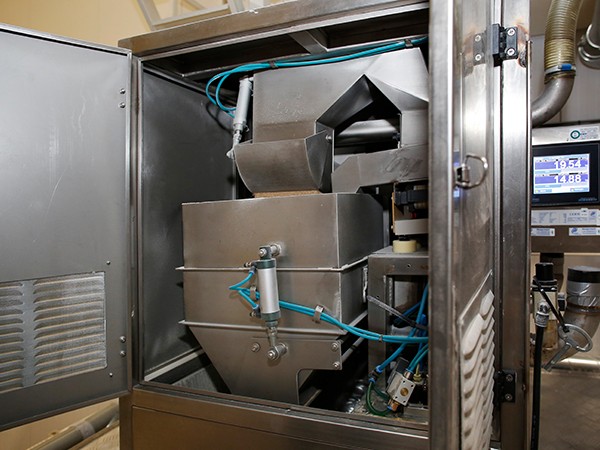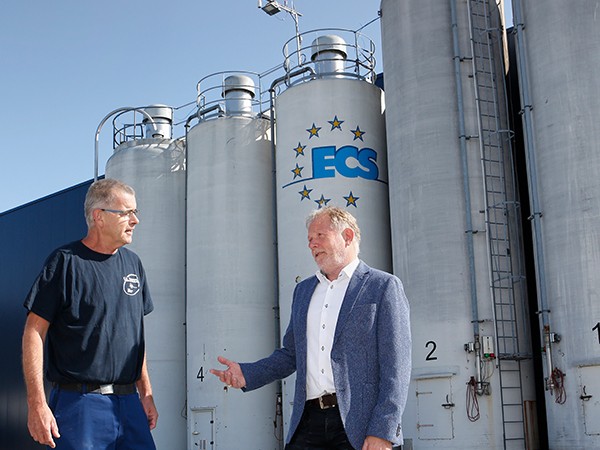
The whole process of breadcrumbs production at De Korrel Beheer in Barneveld - from mixing to filling the packaging - takes place without a single person. Fast and accurate. Penko in Ede combines these properties in its measuring instruments and thus makes an important contribution to the success of its customers.
Jaap van den Born is company manager of the breadcrumbs factory that arose some four years ago on a new industrial estate. ECS Paneermeel Industrie, where the factory is part of, is part of De Korrel Beheer. The production is monitored by a team of three operators in a continuous service. Three ingredients are required for the production: flour, yeast and water. Specific requirements of customers - the type of flour, the use of butter - are recorded in the automated system. The ingredients are used to make a dough, from which small buns are then baked. They do not leave the factory. They are grinded and sifted into breadcrumbs with grains of the desired diameter. "Our products go to snack manufacturers," says Jaap. The whole process, from mixing to filling the packaging, is done without a single human hand. In addition to the three operators, the factory employs two people in internal logistics and two in the technical department. Production should improve to 24 million kilos next year.
A large part of the production is packed in bags of 20 kilos. It is also sent to the customer by big bag and in bulk. The filling of the bags is controlled and measured by Penko's flex controllers. Bert van de Weerd, Penko's senior regional sales manager, knows the process well, since his company provided the filling machines with batch controllers four years ago. "It is important that the right weight is always delivered and that the filling is done as quickly as possible." To start with, the system determines that the weighing bucket is not contaminated - no product has been left behind - and then the filling starts. De Korrel has two filling lines, with a capacity of 2000 and 3000 kilos per hour respectively. There are two weighing buckets per production line, which are filled and unloaded alternately. During the filling process, the controller uses 1600 measurements per second to determine whether it is time for the filling to switch from coarse to the finer (and slower) filling mode. Thanks to this measuring speed, exactly the right moment is determined for the transition. This is necessary in order to make optimum use of the production capacity, while at the same time the measuring systems prevent you from supplying your customers too little, without giving away flour.

Jaap van den Born (links) en Bert van de Weerd (rechts)
"Giving away", says Van den Born, "you can't afford it. The market for breadcrumbs is transparent. If the price of wheat from the new harvest is known, there will be little room for price negotiations. The margins are narrow." ECS is therefore working to further reduce costs and improve efficiency. Further automation should make this possible, Penko is helping De Korrel with this goal. Now some of the information from the measurement systems, among others, has to be further processed 'by hand'. Penko was also asked to weigh and dose two new filling lines of De Korrel Beheer at a different location. This will include the software and presentation options that Penko has in store. The cooperation is growing and is excellent, according to Van den Born. "In the past four years, we have not had to call on Penko for help. That says something."
Too much or too little filling is not only economically undesirable, it is also not permitted by law. All weighing components used by Penko are certified, inspected by the Netherlands Institute for Measurement at the time of installation and calibrated annually. De Korrel's quality system is also certified, according to IFS. "That puts you on a higher level of attention and our market knows that we produce well." The market also knows that the origin of each bag of breadcrumbs has been established and can be traced.
Weighing and dosing cannot be done more quickly and accurately than is currently the case with De Korrel. "Not yet," says Van de Weerd, "but we are constantly working to improve our instruments. We regularly come up with a new production line that is better adapted to the requirements of the coming years". Penko is committed to innovation. "For example, we have developed weighing systems for the open sea. Systems that can handle the fluctuations there." Van de Weerd does not explain how that is possible, but it is clear that he is proud of his company's performance. Just as proud in fact as he is of the programmable flexible controllers.
www.penko.com
www.dekorrelbeheer.nl
Photos: © Ton Kastermans Fotografie
Source: © Vakblad Voedingsindustrie 2019